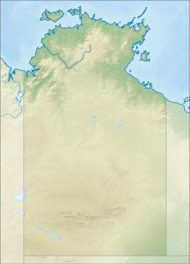Garig Gunak Barlu National Park
| Garig Gunak Barlu National Park Northern Territory | |
|---|---|
 The Coburg Peninsula from above. | |
| Nearest town or city | Jabiru |
| Coordinates | 11°19′16″S 132°10′42″E / 11.32111°S 132.17833°E |
| Established | 2000 |
| Area | 2,260.06 km2 (872.6 sq mi)[1] |
| Managing authorities |
|
| Website | Garig Gunak Barlu National Park |
| Footnotes | |
| Official name | Cobourg Peninsula |
| Designated | 30 March 1992 |
| Reference no. | 545[2] |
| See also | Protected areas of the Northern Territory |
Garig Gunak Barlu is a national park in the Northern Territory of Australia on the Cobourg Peninsula and some adjoining waters about 216 kilometres (134 mi) north-east of the territory capital of Darwin.
It was established by joining the former Gurig National Park and the Cobourg Marine Park. Its name derives from the local Garig language, and the words gunak 'land' and barlu 'deep water'.[3]
The national park consists of all land of the Cobourg Peninsula, of Burford Island, the Sir George Hope Islands (from west to east Greenhill, Wangoindjung, Warldagawaji, Morse, Wunmiyi), Mogogout Island and Endyalgout Island (117.4 km2) to the south of the peninsula, and of adjacent waters. Croker Island, although close east of the peninsula, is not part of the park.
It is categorized as an IUCN Category II protected area.[1]
All six species of Australian marine turtle live in the area of ocean which is included in the park—green sea turtles, hawksbill sea turtles, flatback sea turtles, leatherback sea turtles, and olive ridley sea turtles. The surrounding ocean is also inhabited by sharks and cetaceans, and saltwater crocodiles live near the coast. On land, over 200 species of bird are found in the park, as are several species of mammal.[4]
See also
[edit]References
[edit]- ^ a b c "CAPAD 2012 Northern Territory Summary (see 'DETAIL' tab)". CAPAD 2012. Australian Government - Department of the Environment. 7 February 2014. Retrieved 7 February 2014.
- ^ "Cobourg Peninsula". Ramsar Sites Information Service. Retrieved 25 April 2018.
- ^ "Official fact sheet and map" (PDF). Archived from the original (PDF) on 27 March 2014.
- ^ Australia. Lonely Planet. 2019. p. 836.

